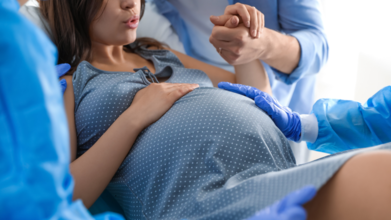- Health Conditions A-Z
- Health & Wellness
- Nutrition
- Fitness
- Health News
- Ayurveda
- Videos
- Medicine A-Z
- Parenting
- Web Stories
13 Foods For A Healthy Pregnancy

13 Foods for a healthy pregnancy (Credits: Canva)
Pregnancy is one of the most wonderful phases in a mother's life. However, it means that the mother needs to take care of herself even more, and ensure that she is getting the right nutrition. This phase is also a transformative journey in itself, and building a healthy eating plan is an important part of ensuring you and your baby get the nutrients you need. So, what a mother needs is a well-rounded diet that can support your baby’s growth and development while keeping you healthy.
Here are 13 foods you must include in your diet during your pregnancy:
Dairy Products
Milk, cheese, and yogurt provide two high-quality proteins: casein and whey.
These proteins found in the dairy products are excellent sources of calcium, which supports your baby’s developing bones and teeth. Additionally, dairy is rich in phosphorus, magnesium, zinc, and B vitamins. Yogurt, especially Greek yogurt, is particularly beneficial as it often contains probiotics that aid digestion. Even if you're lactose intolerant, probiotic yogurts may still be an option.
Legumes
Lentils, beans, chickpeas, and peanuts, are plant-based powerhouses packed with protein, fiber, iron, folate, and calcium. Folate is crucial during the first trimester as it supports fetal development and reduce the risk of neural tube defects. Including legumes in soups, salads, or as hummus can give your body a nutrient boost.
Sweet Potatoes
Rich in beta-carotene, sweet potatoes convert to vitamin A in your body, which is vital for a baby’s organ development. They’re also high in fiber, promoting healthy digestion and reducing constipation—a common pregnancy concern. Roasted sweet potatoes make an excellent base for meals or snacks.
Salmon
This oily fish is a safe seafood option during pregnancy and a rich source of omega-3 fatty acids, which support fetal brain and eye development. Omega-3s may also help lengthen gestation periods. However, be mindful of sourcing to ensure the fish is free of contaminants like mercury.
Eggs
Eggs are a nutritional powerhouse, containing protein, fats, and essential vitamins and minerals. They’re especially rich in choline, a nutrient important for brain development and preventing spinal abnormalities in your baby. Incorporate eggs into wraps, scrambles, or salads for a versatile meal option.
ALSO READ: Why Prenatal Vitamins Are Beneficial For Your Baby?
Broccoli and Leafy Greens
Broccoli and dark leafy vegetables like kale and spinach are brimming with nutrients such as fiber, iron, calcium, folate, and potassium. These veggies are great for preventing constipation and promoting overall health. Add them to smoothies, soups, or pasta dishes if the taste is overwhelming.
Lean Meats
Lean cuts of beef, pork, and chicken are excellent sources of protein and iron, which are crucial for increasing blood volume and preventing anemia during pregnancy. Pairing iron-rich foods with vitamin C-rich options, like citrus fruits, can improve iron absorption.
Berries
Berries, such as blueberries, raspberries, and strawberries, provide a low-calorie yet nutrient-rich snack. They’re full of fiber, vitamin C, and antioxidants while being low on the glycemic index, which helps maintain stable blood sugar levels.
Whole Grains
Whole grains, including quinoa, oats, and brown rice, are rich in fiber, magnesium, and B vitamins. They also contain protein, making them a better alternative to refined grains like white bread. Try incorporating whole grains into bowls, porridge, or side dishes.
Avocados
Avocados are packed with healthy fats, folate, potassium, and vitamin E. These nutrients help support your baby’s skin and brain development while also reducing the risk of leg cramps during pregnancy. Add them to salads, smoothies, or use them as a creamy spread.
Dried Fruits
Dried fruits like prunes and dates are nutrient-dense and portable snacks. They provide fiber, potassium, and iron but should be consumed in moderation due to their high natural sugar content. Combine them with nuts for a healthy trail mix.
Fish Liver Oil
Fish liver oil is an excellent source of omega-3s and vitamin D, both of which are essential for fetal brain development and preventing preterm birth. However, consult your doctor before supplementation to avoid overconsumption of vitamin A, which can be harmful.
Water
Staying hydrated is vital, as your blood volume increases significantly during pregnancy. Drinking 8–12 cups of water daily can prevent dehydration, constipation, and urinary tract infections. Carrying a reusable water bottle can make it easier to stay on track.
Foods to Avoid During Pregnancy
Certain foods can pose risks due to bacterial contamination or toxins. Avoid raw or undercooked meat, fish, and eggs; high-mercury seafood; unpasteurized milk and juices; and processed foods with added sugars and unhealthy fats. Alcohol should be completely avoided to ensure your baby’s safety.
Childhood Obesity Is On The Rise, Doctors Warn; Here’s What Parents Can Do

Credits: Canva
Childhood obesity is a long-term health condition that develops when a child’s weight is above the healthy range for their age, height, and sex. According to Mayo Clinic, doctors define it as having a body mass index (BMI) at or above the 95th percentile for children 2 years and older. September is marked as National Childhood Obesity Awareness Month, and India too is seeing worrying numbers, especially in cities where lifestyle changes, unhealthy diets, and less physical activity are driving the trend.
How Common Is Childhood Obesity?
Childhood obesity is not just a concern in India. In the United States, CDC data from 2017–2020 showed that about 19.7% of children and adolescents between ages 2 and 19 had obesity, roughly 14.7 million young people. Among them, 12.7% were between ages 2–5, 20.7% were 6–11, and 22.2% were 12–19.
Dr Vivek Jain, Senior Director & Unit Head, Paediatrics, Fortis Hospital explains that in recent years, obesity among children has risen sharply due to many factors. Kids are spending more time in front of screens, getting less outdoor play, and attending online classes, all of which cut down their activity levels. At the same time, fast food, sugary drinks, and packaged snacks have become a regular part of diets.
ALSO READ: WHO Guidelines On Weight Loss Drugs For Obesity
Modern lifestyles also encourage frequent dining out, reliance on processed meals, and irregular eating. Add limited access to safe play areas, heavy academic schedules, and family history of obesity, and the risks become even higher. Without intervention, obesity in childhood often continues into adulthood, increasing chances of diabetes, high blood pressure, heart problems, and even some cancers.
Causes Of Childhood Obesity
Obesity develops when children take in more calories than they burn, but it is rarely about laziness or lack of willpower. Several factors play a role:
Genetics and epigenetics
Children with parents or siblings who have obesity are more likely to develop it themselves. Certain genes affect how the body stores and uses energy. Experiences such as trauma or stress can also change how genes work, influencing metabolism and increasing the risk.
Family and home environment factors
Habits at home strongly shape a child’s health. Having sugary drinks, eating oversized portions, frequent snacking on processed foods, dining out instead of cooking, excess screen time, lack of exercise, poor sleep, and even secondhand smoke exposure can all contribute.
Social determinants of health
The surroundings in which children grow up also matter. Affordable healthy food may not always be accessible, and fast-food outlets may be more common. Lack of transport, social support, or safe recreational areas adds to the challenge. School meals and activities also influence a child’s diet and daily routine.
Cultural factors
Advertising and marketing of fast foods and sugary drinks—whether on TV, online, or in stores, make unhealthy options more appealing to children.
How To Prevent Childhood Obesity
Prevention needs a joint effort from families, schools, communities, and policymakers. Parents play the most important role, as they shape habits from an early age. Dr. Vivek suggests:- Balanced nutrition: Encourage home-cooked meals with fruits, vegetables, whole grains, and lean proteins. Limit fried foods, sugary drinks, and packaged snacks.
- Physical activity: Aim for at least 60 minutes of active play or exercise daily, such as sports, cycling, or outdoor games.
- Reduced screen time: Limit television, mobile, and gaming time to help children stay active and sleep better.
- Family involvement: Lead by example—eat meals together, exercise as a family, and make health a priority.
- School initiatives: Schools should provide nutritious meals, promote physical education, and teach healthy habits.
A Viral Instagram Post Makes Several Claims On What Makes Your Kids Sick After A Swimming Session, We Fact Checked It For You, Here's What We Found

Credits: Canva
As summers are here and so are the pool sessions, an Instagram post is making rounds on the social media platform by Ilia Ototiuk, who calls himself an ambassador of discipline, mental and physical wellbeing. The post lists down the reason why kids get sick after a swimming session. The post mentions that the reason is not water, but something else. Health And Me decided to fact check each claim made on the post, and here is what we found.
Claim #1: “The problem isn’t cold water or swallowing pool water.”
Fact Check
According to the US Centers for Disease Control and Prevention (CDC), swallowing or inhaling contaminated pool water can absolutely cause illness. particularly gastrointestinal infections like diarrhea. Germs such as Cryptosporidium can survive for over a week in properly treated pools. While temperature itself doesn’t directly cause colds, swallowing pool water can spread pathogens.
Verdict: Cold water alone won’t give a child a cold, but contaminated water can cause infections.
Claim #2: “The real immune crash happens right after getting out. The body is warm, skin is wet...”
Fact Check
The claim that wet skin and drafts cause an “immune system shutdown” isn’t supported by medical evidence. What actually happens is explained by US Masters Swimming: sudden exposure to cold water can trigger cold water shock, affecting heart rate, breathing, and circulation. Extended exposure can lead to hypothermia or afterdrop (continued cooling even after leaving the water).
Verdict: The body does not “shut down immunity.” Instead, risks are linked to cold-water shock and hypothermia, especially if kids don’t warm up quickly after swimming.
Claim #3: “Sitting around in wet swimsuits for 5–10 minutes makes the body vulnerable.”
Fact Check
As per Texas A&M Health and the Mayo Clinic, sitting in wet swimsuits doesn’t cause colds, but it can cause fungal infections (like yeast infections or jock itch) and skin irritation from chafing. Prolonged dampness makes an ideal environment for fungi and bacteria.
Verdict: The real risk is fungal or bacterial skin infections, not colds. Parents should change kids into dry clothes quickly after swimming.
Claim #4: “Not drying hair causes sinus overload and colds.”
Fact Check
The Cleveland Clinic explains that wet hair itself does not cause colds. Viruses such as rhinovirus are the culprits, not damp scalps. While cold environments may help viruses spread more easily, wet hair is not a direct cause of runny noses, sore throats, or fevers.
Verdict: Leaving hair wet or letting it "air dry" won’t cause colds. However, drying kids’ hair after swimming can help them stay comfortable and prevent feeling chilled.
Claim #5: “Skipping post-swim snacks weakens immunity.”
Fact Check
According to the BBC 2023 report, post-exercise nutrition is important, especially within 30–60 minutes after swimming. The body needs carbohydrates to replenish glycogen and protein to repair muscles. Skipping food doesn’t directly cause infections, but poor recovery can increase fatigue and stress, making the body less resilient.
Verdict: It’s true that kids should eat a balanced snack after swimming, ideally carbs + protein, but saying “immunity weakens” without food is an exaggeration.
Fact Check: Is Giving Birth On Your Back Against Your Body's Natural Anatomy?

Credits: Canva
"I may or may not burst some bubbles with this comment, but what if I told you that your pelvis was in fact not too small and or that your baby's head was in fact not too big?" says Amber Grimmett, a US-based Pregnancy and
Postpartum Coach. In her post, she also writes that the position most women give birth in, also called the lithotomy position or lying on your back is "against your body's natural birth mechanics". In a video she posted on her Instagram @fierce.not.fragile, she talks about pelvis and baby's head size, explaining how the birthing position that has been made standard may not be right.
She says that when the mother lies flat on her back with knees wide, her tailbone cannot move freely and the pelvic outlet, the space baby needs to exit, "literally closes off".
This, she says, creates a domino effect. Then comes longer labors, more interventions, and higher risk of pelvic floor dysfunction. "Your body was designed to birth, but not in positions that fight against its natural design," she writes.
What Does Science say?
We did a fact check on her claim and here's what we found.
For most women in the United States today, giving birth means lying on a bed, feet in stirrups, and being told when and how to push. But mounting research, including a 2014 study published in The Journal of Perinatal Education, titled, 'Healthy Birth Practice #5: Avoid Giving Birth on Your Back and Follow Your Body’s Urge to Push' suggests this common practice, known as the supine or lithotomy position—might not actually be the safest or most effective way to bring a baby into the world.
How Birth Ended Up on Its Back
For centuries, women birthed in positions that worked with gravity, standing, squatting, sitting, or even using stools or ropes for leverage. These upright positions made physiological sense: gravity helped the baby descend, shortened labor, and reduced maternal fatigue.
Then came King Louis XIV of France. Fascinated by childbirth, he reportedly preferred to watch his mistresses deliver, and lying flat gave him the best view. The practice caught on among European aristocracy and eventually spread widely.
By the early 1900s, births had largely moved from homes to hospitals. Doctors saw childbirth less as a natural process and more as a medical procedure. Putting women on their backs gave physicians easier access for interventions such as forceps delivery, anesthesia, and continuous fetal monitoring. Convenience for the doctor—not necessarily benefit for the mother or baby, became the standard.
The Problem with the Supine Position
Research over the past three decades has consistently shown that giving birth lying flat has no clear benefits for either mother or baby. In fact, there are multiple disadvantages:
- Longer Labor: When women lie flat, the baby must work against gravity, which can slow descent.
- Narrower Pelvis: The supine position can actually reduce pelvic diameter, making delivery more difficult.
- Increased Risk of Interventions: Supine births are linked with more use of forceps, vacuum deliveries, and episiotomies.
- Reduced Blood Flow: Lying on the back can compress major blood vessels behind the uterus, reducing blood flow to the baby.
- More Perineal Trauma: Directed, forceful pushing while on the back is associated with more tears and a weakened pelvic floor, raising the risk of urinary incontinence later.
Despite this, U.S. survey data shows that nearly 70% of births still happen in supine or lithotomy positions, with fewer than 10% of women using traditional squatting, standing, or side-lying positions.
The Case for Upright and Spontaneous Pushing
Standing, kneeling, and squatting use gravity to help the baby descend and can even widen the pelvic outlet, giving more room for delivery. Even side-lying, which is gravity-neutral, has been shown to reduce perineal tearing.
Equally important is how women push. Many hospitals still direct women to push forcefully for long periods, holding their breath. But evidence shows that spontaneous, self-directed pushing—where the woman follows her own urge, improves oxygenation, reduces maternal stress, and lowers the risk of fetal distress.
In fact, research has found that directed pushing only shortens labor by about 13 minutes on average, a difference not considered clinically significant but one that may come at the cost of pelvic floor damage.
Rethinking Hospital Policies
Some hospitals have strict time limits on how long the second stage of labor (pushing phase) can last before recommending interventions such as a C-section, even if there are no signs of danger for mother or baby. Recent guidelines from the American College of Obstetricians and Gynecologists (ACOG) now acknowledge that the second stage can safely last much longer, up to five hours for first-time mothers with an epidural.
However, there is little emphasis on letting women move freely, change positions, or delay pushing until their natural urge returns. This gap between research and practice persists, though midwives and doulas are often more supportive of these evidence-based approaches.
© 2024 Bennett, Coleman & Company Limited

